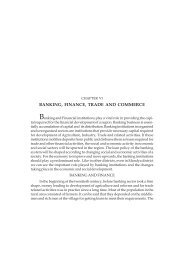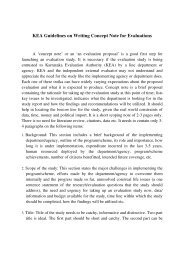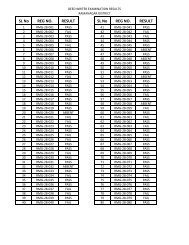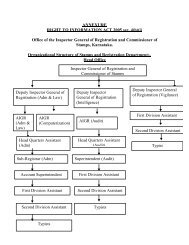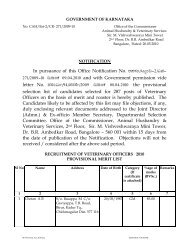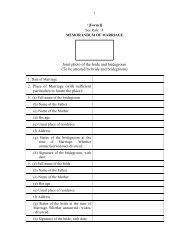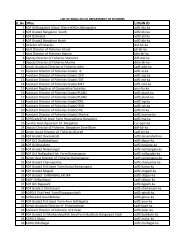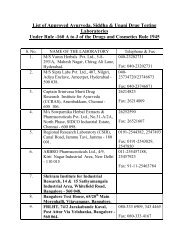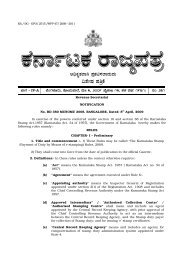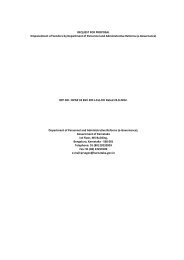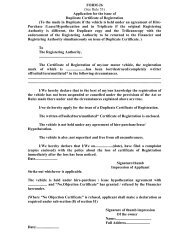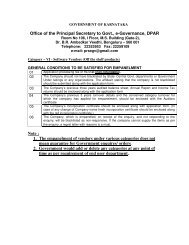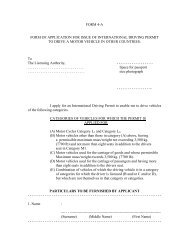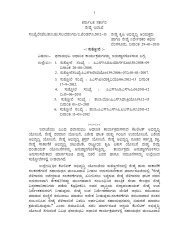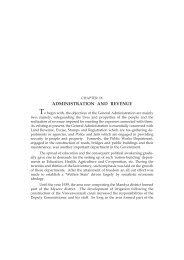Chapter XIII CULTURE - Government of Karnataka
Chapter XIII CULTURE - Government of Karnataka
Chapter XIII CULTURE - Government of Karnataka
You also want an ePaper? Increase the reach of your titles
YUMPU automatically turns print PDFs into web optimized ePapers that Google loves.
A Handbook <strong>of</strong> <strong>Karnataka</strong> 482<br />
the frontiers <strong>of</strong> Navya poetry. Kambara has a good command on the diction and<br />
tunes <strong>of</strong> the folk poetry, like Bendre, but who used them to embody the tensions<br />
<strong>of</strong> life caught between tradition and a new culture. He has made a mark as a<br />
poet, a novelist and a dramatist. His ‘Jokumara Swamy’ besides other awards,<br />
has won the prestigeous Kamaladevei Chattopadyaaya Award. It is a hit play,<br />
with liveliness, good song and gaiety. A.K. Ramanujam, a remarkable poet,<br />
presented clear, vivid pictures with an apparent casualness. S.L.Byrappa who<br />
shot into fame with his ‘Vamshavriksha’ is one writer who has scrupulously<br />
avoided confining himself into any frame. Some <strong>of</strong> his celebrated works are<br />
‘Anveshane’, ‘Grihabhanga’, ‘Thabbaliyu Neenade Magane’, ‘Daatu’, ‘Sartha’,<br />
‘Mandra’ ‘Thanthu’ and ‘Aavarana’.<br />
Post-Navya writing is sometimes called as Navyotthara Sahitya or Bandaya<br />
Sahitya, or even Dalita Sahitya. The writers belonging to this movement are <strong>of</strong><br />
the firm view that only Daliths can authentically write about their trials and<br />
tribulations, and anything written by others, however, impressive it might be,<br />
will still remain second-hand experience. Still, it is interesting to note that<br />
Devanuru Mahadeva who does not like to classify himself into this or that<br />
group or ‘ism’ has given some <strong>of</strong> the finest Dalit literature. His ‘Odalala’ and<br />
‘Kusuma Bale’ have won many laurels. Chennanna Valikar and Siddalingaiah<br />
are other notable Dalith writers. B.T. Lalitha Nayak, Aravinda Malagatti and<br />
Geetha Nagabhushana are other important writers who are identified with their<br />
notable Dalith works. G.Venkataiah <strong>of</strong> Maddur Taluk had written some books<br />
in 1940 itself highlighting the pains and pleasures <strong>of</strong> Dalith people even before<br />
there was any such movement.<br />
The Feminist movement began after the Dalit movement. Women writers<br />
started writing independently about their own experiences that had quite a<br />
different dimension. They not only questioned the male supremacy in society<br />
but also tried to bring about equality with men. The works <strong>of</strong> R. Kalyanamma,<br />
who published ‘Saraswathi’ a montly for 42 years, Nanjanagudu Tirumalamba<br />
who published ‘Sathi Hithaishini’ and then ‘<strong>Karnataka</strong> Nandini’. Sarawathi Bai<br />
Rajawade (Giri Bale) who had new attitude and a vision <strong>of</strong> modern education<br />
for women, Kodagina Gouramma, Belagere Janakamma, Shyamala Devi<br />
Belagaumkar and the like, gained prominence in 80’s and after, through the<br />
feminist writers <strong>of</strong> this movement. ‘Phaniyamma’ by M.K. Indira, ‘Itigeetike’ by<br />
Vijaya Dabbe, ‘Gandasuru’ by Veena Shanteshwar, ‘Sahana’ by Sara Abubakar,<br />
‘Seetha Rama Ravana’ by H.V. Savitramma are some such quotable writings.<br />
The ‘<strong>Karnataka</strong> Lekhakiyara Sangha’ a feminist writers organisation founded<br />
in 1978, played an important role in giving a feminist touch to social values<br />
and also in mirroring them in the writings <strong>of</strong> women. ‘Streevani Praveshike’<br />
edited by B.N. Sumitra Bai and N. Gayathri is noteworthy. Many women writers<br />
wrote books on different fields from a womens’ points <strong>of</strong> view. Among them<br />
mention may be made for their writings and related activities <strong>of</strong> Hemalatha<br />
Mahishi (Law), H. Girijamma and Leelavathi Devadas (Health), Vijaya and S.<br />
Malathi (Theatre), Namichandra (Science and Fiction) and Vaidehi (Fiction).<br />
B.N. Sumithra Bai, Vijaya Dabbe and many others are good feminist critics.<br />
(The list is not exhaustive.) Feminist poets are large in number. Following this



